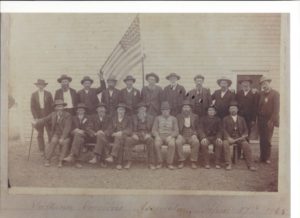In the last post, the question was asked, "Why do we remember the Sultana?" In this entry, I'd like to concentrate on who we are remembering.
Naturally, our first thoughts center on those on board the boat. These were mainly Union soldiers, recently released after being held in Confederate prisons for as long as two years at Andersonville, Georgia and Cahaba, Alabama. Many of these men had survived the horrors of war and the cruelty of captivity. Their thoughts turned toward home as they headed north on the Mississippi River from Vicksburg to their ultimate destination of Camp Chase in Ohio to be mustered out. Also traveling on the Sultana were as many as 100 civilian passengers, a number of them women and children. The boat's crew numbered 85. Each person had his or her unique life story to tell. For almost half of them, the story ended in the early morning hours of April 27, 1865.
The families of those who were on the Sultana must be remembered. Unlike today's instantaneous news reports, it took time for information about the disaster to reach the masses. Many family members were never able to achieve what we today call "closure". Far too many of those who perished were laid to rest in graves marked "Unknown Soldier". Some bodies were never recovered. And for those who welcomed home a survivor, everyday life was sometimes far from "normal".
The people of Memphis, Tennessee and Marion, Arkansas should be remembered for their heroic rescue efforts and hospitality toward total strangers, even former enemies. Were it not for their compassion and charity, the death toll would undoubtedly have been higher. Today, both cities continue to remember the Sultana in significant and meaningful ways.
Finally, we owe a debt to those who have kept the story of the Sultana alive for almost 153 years. Multitudes have kept this terrible tragedy from being forgotten as the account has been passed from generation to generation. Some have spent many years of their lives making sure this part of our shared history is not overlooked. The fact remains that after fifteen decades and counting, more people know about the Sultana disaster than at any time in history.
It's sometimes difficult to remember someone if we don't have a photo or likeness of them. The lament I hear most often, from those who discover they are related to one (or more) who experienced the tragedy, is that there is no picture available to ponder while remembering. I commend all of the genealogists, historians, researchers, writers, and artists who strive to put faces to names and information to inquiries from those who want to find out about their ancestors. And I challenge each of us to record the histories of our own families. Future generations will be grateful for the help in remembering.
Next time, we'll talk about what we are remembering about the Sultana. Your feedback is welcome. Thanks for sharing this journey as we remember the Sultana!



No comments yet. You should be kind and add one!
The comments are closed.